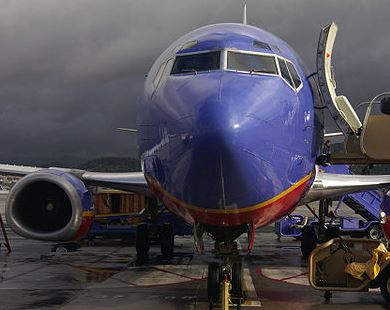Transportation
Analyst Says Airline Rally Is Not Over: 4 Stocks to Buy Now
Published:
Last Updated:
One sector that has been on fire this year is one that many think is growing a little long in the tooth. The airlines have had a dramatic jump this year, and many analysts on Wall Street have pointed to the dramatic drop in fuel prices, which can be as much as 30% of total costs, as a leading factor. A new research note from UBS cites the fact that the airlines still have considerable pricing power, and the analysts see corporate travel and spending remaining very firm during 2015.
Often in the past when oil and jet fuel prices have plummeted, it meant the economy had fallen on shaky ground, and the major airlines slashed ticket prices. If you have traveled recently, you know that is hardly the case, with prices high and planes full. The UBS team has a focus on four top airlines to buy that they feel can have continued strength and momentum in 2015.
Alaska Air Group Inc. (NYSE: ALK) is the parent company of Alaska Airlines, and it reported impressive traffic data for November 2014, buoyed by very strong demand. The company serves more than 100 cities through an expansive network in Alaska, the Lower 48, Hawaii, Canada and Mexico. Despite recent challenges by other carriers for superiority in the Northwest, the company has strong customer loyalty, which has contributed to outstanding earnings and revenue growth.
Alaska Air investors are paid a small 0.9% dividend. The UBS price target for the stock is $60. The Thomson/First Call consensus price target is $60.58. Shares closed trading Tuesday at $56.40.
ALSO READ: 10 Brands That Will Disappear in 2015
Delta Air Lines Inc. (NYSE: DAL) was named the 2014 Airline of the Year by Air Transport World magazine and was named to FORTUNE magazine’s 50 Most Admired Companies, in addition to being named the most admired airline for the third time in four years. The company posted very solid third-quarter earnings, and the rest of the year and 2015 could prove to be even better, especially if jet fuel prices continue to subside.
Investors are paid a tiny 0.6% dividend. The UBS price target is $55, and the consensus target for the airline is $53.94. Delta closed Tuesday at $46.33.
Southwest Airlines Co. (NYSE: LUV) has gone from industry underdog to an industry leader, and it is another stock that screens very favorably at UBS. With the domestic market showing good strength, and the pricing environment looking very solid for 2015, revenues should stay strong and continue to grow. Tumbling jet fuel prices, which is almost 30% of Southwest’s total costs, have been a key for improving revenues and earnings. Southwest is also busy expanding routes and adding new gates at key airports. With the restrictive Wright amendment now history at the airline’s main hub in Dallas, the company can now expand routes all over the country to add additional revenue and service.
Southwest investors receive a small 0.6% dividend. UBS has a $47 price objective for the stock, and the consensus target is $46. The stock closed Tuesday at $40.73.
United Continental Holdings Inc. (NYSE: UAL) has been a show-me story for many investors, as the merger has not been smooth and customers have experienced numerous computer glitches that have snarled traffic over the past two years. With some of the problems starting to recede, the company does have earnings growth prospects that could outshine some of the major competition in 2015 and beyond. Increased Asian traffic could be the wildcard for the stock, as many think the corporate and leisure business to the region is poised to pick up.
While the UBS price target is $68, the consensus target is $64.50, and United closed Tuesday at $62.52 a share.
ALSO READ: The 5 Most Shorted Stocks on the Nasdaq
Clearly much of the big upside for the stocks has been made. With that caveat in mind, the tailwind from lower jet fuel pricing and an improving economy should still propel the stocks to solid gains in 2015.
After two decades of reviewing financial products I haven’t seen anything like this. Credit card companies are at war, handing out free rewards and benefits to win the best customers.
A good cash back card can be worth thousands of dollars a year in free money, not to mention other perks like travel, insurance, and access to fancy lounges.
Our top pick today pays up to 5% cash back, a $200 bonus on top, and $0 annual fee. Click here to apply before they stop offering rewards this generous.
Flywheel Publishing has partnered with CardRatings for our coverage of credit card products. Flywheel Publishing and CardRatings may receive a commission from card issuers.
Thank you for reading! Have some feedback for us?
Contact the 24/7 Wall St. editorial team.